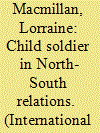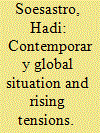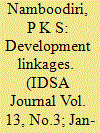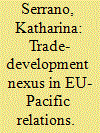| Srl | Item |
| 1 |
ID:
087315


|
|
|
|
|
| Publication |
2009.
|
| Summary/Abstract |
This paper critiques the hegemonic constructions of child soldiers to be found in civil society and Anglophone media accounts. Close examination of these texts reveals that the discourse mirrors Anglophone imaginaries and preoccupations over childhood rather than the distinctive concerns of child soldiers themselves. It claims that the discourse accomplishes considerable political work in buttressing the international order between the global North and South. Furthermore, it asserts that the discourse operates as a site where wider Anglophone fears over the functioning of its personal, "private" sphere can be rehearsed and disciplined.
|
|
|
|
|
|
|
|
|
|
|
|
|
|
|
|
| 2 |
ID:
184941


|
|
|
| 3 |
ID:
184900


|
|
|
| 4 |
ID:
112800


|
|
|
|
|
| Publication |
2012.
|
| Summary/Abstract |
There is a widespread perception that power is shifting in global politics and that emerging powers are assuming a more prominent, active and important role. This article examines the role of emerging powers such as China, India, Brazil and South Africa (BASIC) in climate change politics and the extent to which their rise makes the already difficult problem of climate change still more intractable-due to their rapid economic development, growing power-political ambitions, rising greenhouse gas emissions and apparent unwillingness to accept global environmental 'responsibility'. By reviewing the developments in global climate politics between the 1992 Rio Earth Summit and Rio+20, this article unsettles the image of a clear shift in power, stressing instead the complexity of the changes that have taken place at the level of international bargaining as well as at the domestic and transnational levels. Within this picture, it is important not to overestimate the shifts in power that have taken place, or to underplay the continued relevance of understanding climate change within the North-South frame. Emerging powers will certainly remain at the top table of climate change negotiations, but their capacity actively to shape the agenda has been limited and has, in some respects, declined. Even though emerging powers have initiated and offered greater action on climate change, both internationally and domestically, they have been unable to compel the industrialized world to take more serious action on this issue, or to stop them from unpicking several of the key elements and understandings of the original Rio deal. At the same time, developing world coalitions on climate change have also fragmented, raising questions about the continued potency of the 'global South' in future climate politics.
|
|
|
|
|
|
|
|
|
|
|
|
|
|
|
|
| 5 |
ID:
075644


|
|
|
|
|
| Publication |
2006.
|
| Summary/Abstract |
The analytical nucleus of this paper is formed through a consideration of some primary aspects of the interconnections between a resurgent imperialism and a contested terrain of democratic politics. There are three sections: in the first part an exploratory examination of significant elements of the contemporary literature on imperialism is developed. This includes a discussion of the relationality of imperial power, the differentiation of imperiality from imperialism and the neglected importance of the agents of imperialist power. The second section attempts to tease out some of the specificities of the USA as an imperial democracy set within a broad context of North - South relations. This leads into a final discussion of the geopolitics of democratisation. The paper is an exploratory treatment of certain features of an extensive conceptual and political terrain formed by the intersections between imperialism and democratic politics.
|
|
|
|
|
|
|
|
|
|
|
|
|
|
|
|
| 6 |
ID:
101833


|
|
|
|
|
| Publication |
2011.
|
| Summary/Abstract |
For almost 40 years, relations between the European Union and African, Caribbean and Pacific (ACP) countries centred on trade and development policy. The partnership survived various challenges and evolved into an institutionalised model for North-South relations. In reaction to internal and external forces of change, in the Cotonou Agreement (2000) the EU introduced to its relations with the developing world a new trade-development paradigm to be implemented via Economic Partnership Agreements. The latter are intended to be innovative foreign policy instruments, functioning as development tools and trade liberalisation mechanisms. Against the background of current internal restructuring of EU foreign policy and an increasingly politicised development agenda, this article undertakes an enquiry into the nature of the trade-development nexus in EU-Pacific Island countries (PICs) relations. The analysis is based on a theoretical framework which employs assumptions and findings related to IR theory, referring in particular to realism and dependency theory. A critical examination of EU policies shaping the trade-development nexus reveals that it is a rather flexible foreign policy tool, equipped with an auto-adjustment mechanism to ensure the balance of EU trade and development objectives. From PICs' perspective, its predictability and therefore developmental value, may, however, be diminished.
|
|
|
|
|
|
|
|
|
|
|
|
|
|
|
|